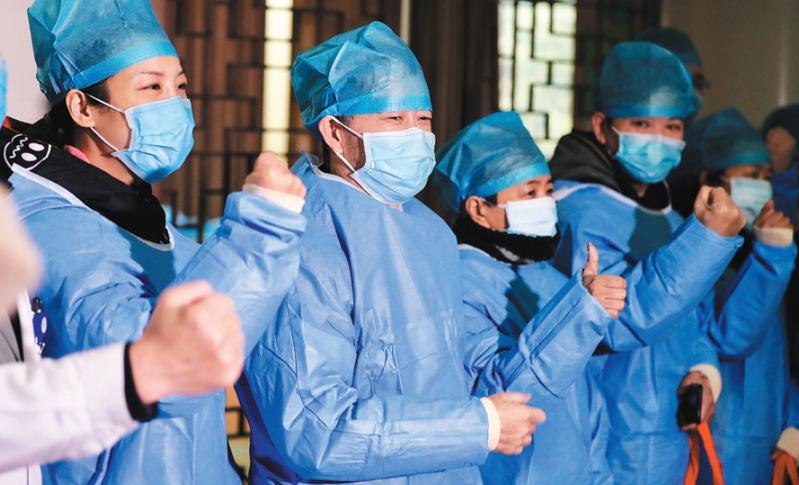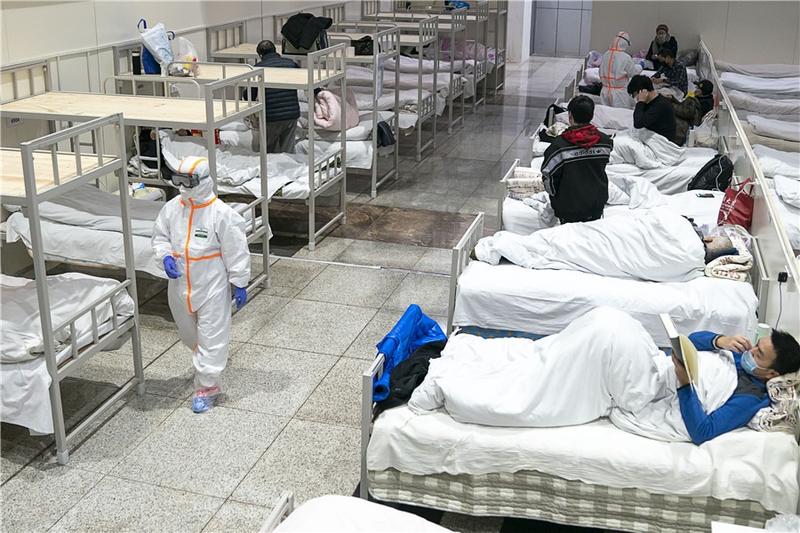 Patients who have recovered from the novel coronavirus gesture to show their determination in the struggle against the outbreak at Hubei Provincial Hospital of Integrated Chinese and Western Medicine in Wuhan on Feb 6, 2020. (ZHU XINGXIN / CHINA DAILY)
Patients who have recovered from the novel coronavirus gesture to show their determination in the struggle against the outbreak at Hubei Provincial Hospital of Integrated Chinese and Western Medicine in Wuhan on Feb 6, 2020. (ZHU XINGXIN / CHINA DAILY)
Wuhan, the epicenter of the ongoing outbreak of the novel coronavirus, has begun making door-to-door visits to identify people who are infected or suspected to be in order to reduce sources of infection.
The move was made while Vice-Premier Sun Chunlan called on the city government to act in "a state of war" and fully implement all prevention and control measures.
The move was made while Vice-Premier Sun Chunlan called on the city government to act in "a state of war" and fully implement all prevention and control measures
The number of patients diagnosed with the virus in Wuhan, provincial capital of Hubei, reached 10,117 as of Wednesday midnight, taking up 36 percent of the national total, according to the National Health Commission.
Sun, who is in charge of healthcare in the State Council and is head of the special work group to guide novel coronavirus epidemic control in Hubei, said on Thursday that those who are infected and suspected to have been infected, as well as people who have a fever of an unknown cause and close contacts with diagnosed patients, must be transferred to quarantine facilities and hospitals immediately after door-to-door screenings.
READ MORE: Xi urges joint efforts to fight epidemic
Not a single family or person should be missed, she said at a meeting in Wuhan. There are about 9 million people still in Wuhan, which has been under lockdown since Jan 23.
Sun said fighting the outbreak is the most important and urgent task for the government at the moment, There must be officials on duty 24 hours a day, she said.
To ease the shortage of hospital beds in the city and treat as many people as possible, the Wuhan health commission announced on Wednesday night that all hospitals will only treat novel coronavirus patients who are in severe condition.
Setting up these temporary hospitals is not an ideal solution but at the moment it's the best solution to prevent the virus from spreading among family members and communities
Wang Chen, president of the Chinese Academy of Medical Sciences
Eleven temporary hospitals in gymnasiums and exhibition halls around the city will take those with mild symptoms. Other venues such as hotels and schools have also temporarily taken over by the government to accommodate other high-risk groups.
ALSO READ: China asks businesses outside Hubei to resume operations
As of 7:30 am on Thursday, the temporary hospital at Hongshan Gymnasium, which was completed in two days, began to provide medical treatment for the first group of 328 patients who tested positive for the virus but showed no severe symptoms.
Staffed with about 300 medical workers, the hospital will ultimately be capable of housing 800 patients. Every 50 patients will be taken care of by four doctors and 12 nurses.
After the completion of all the temporary hospitals, 10,000 to 20,000 patients will be able to receive treatment there, according to local authorities. These hospitals will only admit confirmed patients ages 18 to 65 who are able to care for themselves and have no other respiratory, cardiovascular and cerebrovascular diseases or mental illness.
Wang Chen, a leading expert on respiratory and critical care medicine and president of the Chinese Academy of Medical Sciences, said the move can effectively control infection sources in the city.
"The key (to controlling the epidemic) is to get all the confirmed patients into hospitals so that they can receive medical treatment and be effectively quarantined and not have contact with family members and the community," he told China Central Television on Wednesday night.
Due to the shortage of hospital beds in the city, many patients with mild symptoms had to quarantine themselves at home, which has increased the risk of spreading the virus among family members and communities, he said.
He said patients with mild symptoms are relatively more mobile, which means they are more likely to spread the virus. "We must provide centralized quarantine facilities with enough beds such as these temporary hospitals to keep the patients away from society while receiving treatment," he said.
"If the patient's condition deteriorates, we would be able to transfer them to a regular hospital without delay. Although, the condition at the temporary hospitals cannot compare to that at regular hospitals, the patients can receive proper medical treatment," said Wang, who has been in Wuhan since Saturday.
"Setting up these temporary hospitals is not an ideal solution but at the moment it's the best solution to prevent the virus from spreading among family members and communities," Wang added.
 Patients with mild symptoms are quarantined in a mobile cabin hospital in Wuhan. (YUAN ZHENG / CHINADAILY.COM.CN)
Patients with mild symptoms are quarantined in a mobile cabin hospital in Wuhan. (YUAN ZHENG / CHINADAILY.COM.CN)
Some hospitals and hotels in the city had been used to quarantine people who have fever or are suspected to have been infected with the virus.
A doctor at Huihua Hospital told Xinhua News Agency on Wednesday that all of its 24 wards have been fully occupied with patients who have fever. However, medical supply shortages at some quarantine facilities had become a problem, the report said.
A Chinese expert said Friday that so far there is insufficient data to prove mother-to-child transmission of the novel coronavirus.
Menawhile, students who are home for winter vacation are barred from returning to schools without permission, and all nonessential personnel must avoid campuses to prevent the spread of novel coronavirus at schools, Minister of Education Chen Baosheng said on Friday.
Liu Kun in Wuhan contributed to this story
With Xinhua inputs


